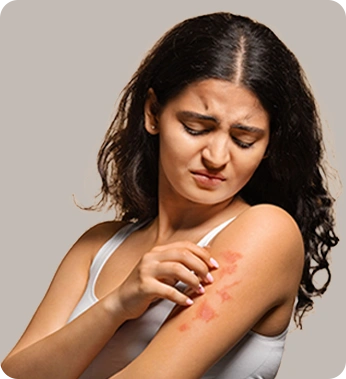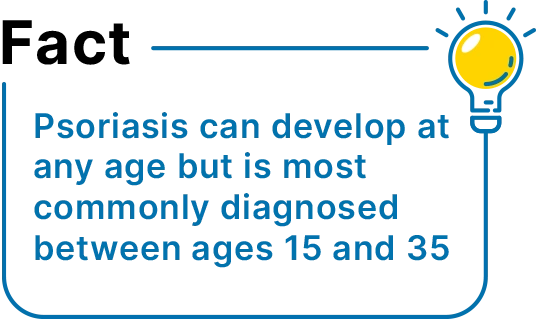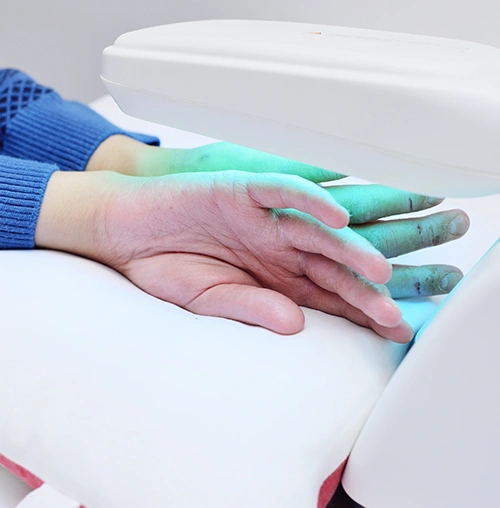
Dr Batra's® offer homeopathic treatment that addresses the root cause of psoriasis, providing long-term relief without the side effects associated with conventional medicines
Do you know? Psoriasis affects around 2-3% of the global population, with over 1 crore cases in India alone. It is a chronic autoimmune disorder that can impact both physical comfort and emotional well-being
Reduces Skin Inflammation
Remedies like Arsenicum Album and Graphites help calm redness and alleviate scaly patches
Relieves Itching and Burning
Sulphur effectively soothes discomfort without the use of steroids
Prevents Recurrence
Homeopathy addresses triggers such as stress, diet, and lifestyle, minimising flare-ups
Boosts Immunity
Strengthens the body's defense mechanism, reducing autoimmune reactions that cause skin inflammation


To achieve optimal results with alopecia homeopathic remedies, it is essential to follow a comprehensive care plan. Here's a step-by-step process:
Safe for All Ages
Gentle and free from harmful chemicals
Long-Term Relief
Prevents flare-ups by targeting internal triggers
Personalised Treatment
Custom remedies based on your specific symptoms
No Dependency
No need for lifelong medication

Symptoms like scaling, redness, or itching persist despite conventional treatments
You prefer a natural, side-effect-free approach
You seek a holistic treatment plan that addresses both physical and emotional health
Advanced Diagnostic Tools
Accurate assessment using Wood's Lamp technology
Personalised Treatment Plans
Remedies combined with dietary guidance and lifestyle tips
Proven Expertise
Over 40 years of experience in treating skin conditions
Natural Healing
No steroids, no dependency—just holistic care
Take our psoriasis test online to assess your symptoms and get personalised guidance for your next steps
Medically reviewed by

Dr. Vaishali Kamat
20+ years of experience
Psoriasis is an autoimmune condition causing red, scaly skin patches. Homeopathy treats the underlying causes, balances the immune system, and provides personalised, side-effect-free relief, addressing physical and emotional triggers for long-term improvement.
Homeopathic medicines are natural, non-toxic, and safe for all age groups. They work gently without causing any side effects, making them ideal for long-term use and sensitive patients, including children and the elderly.
Results vary, but most patients notice significant improvement within 2-3 months of consistent treatment. Homeopathy focuses on gradual, long-term healing, offering sustainable relief by addressing the condition's root causes.
Yes, homeopathy complements conventional treatments. It can enhance overall outcomes by reducing symptoms and improving immunity. Always consult your doctor to ensure the safe integration of therapies.
Homeopathy effectively treats scalp, nail, plaque, and pustular psoriasis by customising remedies to individual symptoms, triggers, and overall health, ensuring comprehensive relief and management of all psoriasis types.
Top homeopathic remedies for psoriasis include:
Arsenicum Album: Eases dry, scaly patches
Graphites: Heals cracked, bleeding skin
Sulphur: Reduces redness and itching
Sepia: Treats scalp psoriasis
Calcarea Carbonica: Strengthens immunity
Petroleum: Soothes dry, cracked hands and feet
Stay Hydrated:
Drink ample water to keep skin moisturised and prevent dryness
Follow an Anti-Inflammatory Diet:
Eat omega-3-rich foods like fish, walnuts, and leafy greens to reduce inflammation
Use Gentle Skincare:
Choose fragrance-free, hypoallergenic products to avoid irritation
Avoid Triggers:
Limit smoking, alcohol, and processed foods to prevent symptom flare-ups
